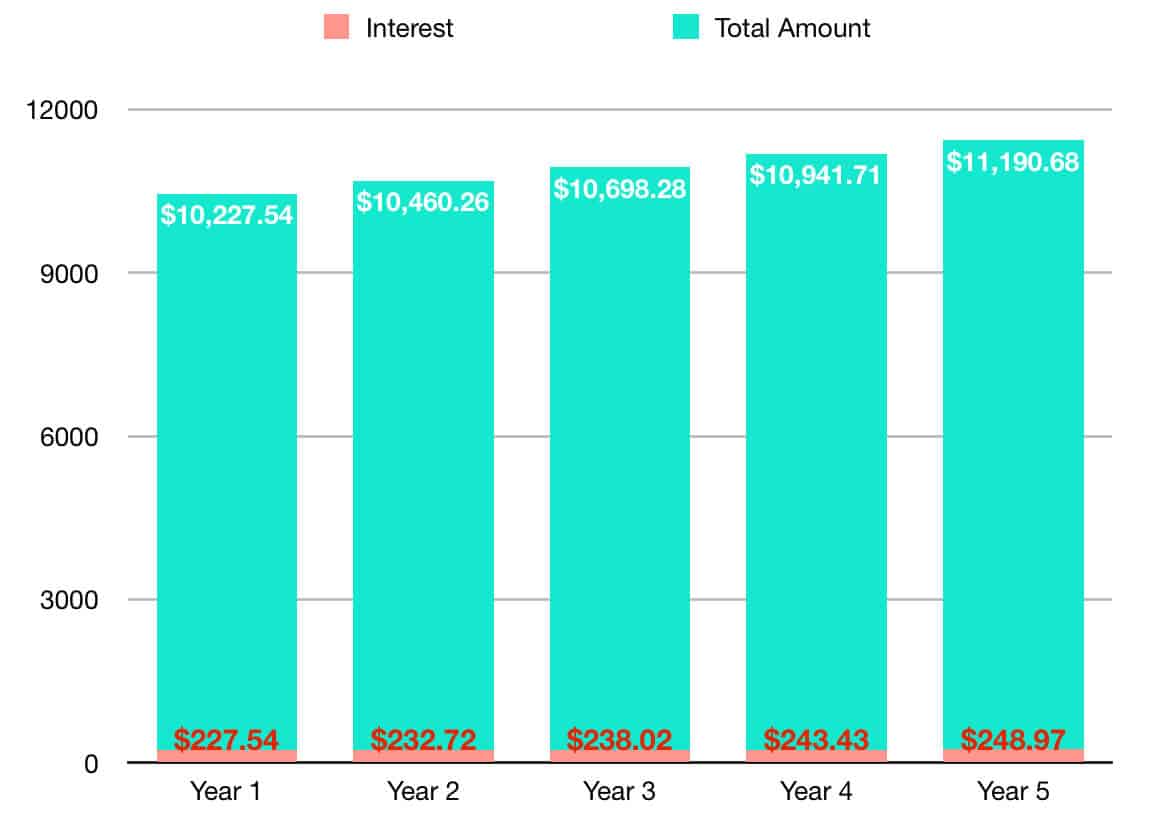Use the CD Calculator to find out how much your CD will be worth when you cash it in at maturity. You can also use it to calculate the value of a savings account at a future date.
Use our CD Rate Calculator Now
How do you use the CD Calculator?
You’ll need to put in the following information:
Present Value: Enter your initial investment in your CD, or the amount in your savings account today (don’t put any commas in the figure).
Interest Rate (% Per Period): There are two possibilities here, depending on the information you have. If you know what the yield is for your account (the Annual Percentage Yield or APY), then enter this figure into the CD calculator. Otherwise, if you know what the yearly interest rate is, then divide the interest rate by 365 (the number of days in a year), and enter the result here.
Number Of Periods: According to what you used for the Interest Rate described above, you also have two possibilities here. If you used the yield (an annual figure) as the input for the Interest Rate, then put the number of years into the CD calculator. On the other hand, if you used a daily interest rate for the Interest Rate, then put in the number of days here (for example, 3650 days if you wanted to specify the equivalent of ten years).
Future Value: When you’ve entered in the data above and clicked on “Calculate”, this is the result. The CD Calculator tells you how much money you’ll have from your CD or in your savings account at the date in the future that you defined via the number of periods.
How is the value of a CD calculated?
Our calculator allows you to quickly and easily determine your potential return on an investment in a CD. When shopping for CDs, you will find it useful to understand how the future value of your CD is calculated. CDs earn compound interest, which means the value of your investment increases on a periodic basis. Compound interest on CDs is typically calculated daily. The basic inputs are:
P – principal amount (initial deposit)
r – interest rate (APY)
n – number of compounding periods
t – number of years until the maturity date
Our calculator also includes the tax and inflation rate, as these two variables will affect the value of your CD at maturity. Following is the basic CD calculation formula (minus taxes and inflation):
CD Value = P × (1 + r/n)t×n
If you invested $10,000 in a CD with an interest rate of 2.25 percent and a maturity date of 5 years (APY 2.275%) , your total amount on the maturity date would be:
CD Value = 10,000 (1+0.0275)/365)^(365(5))
$10,000 (Principal Amount) + $1,190.68 (Total Interest Earned) = $11,190.68
What are the limitations of the CD Calculator?
The CD Calculator uses only a fixed rate in its calculation. With savings accounts and money market accounts, both fixed and variable interest rates are commonly used. A variable rate on your savings account will fluctuate with the benchmark interest rate set by the central bank every few months. There may also be differences in the way the compound interest is calculated; some CD interest calculations use a figure of 360 periods per year instead of 365. In general, however, CDs using daily (or nearly daily) compounding of interest are preferable to those that only compound a few times a year.
Trusted & Regulated Stock & CFD Brokers
What we like
- 0% Fees on Stocks
- 5000+ Stocks, ETFs and other Markets
- Accepts Paypal Deposits
Min Deposit
$200
Charge per Trade
Zero Commission on real stocks
64 traders signed up today
Visit Now67% of retail investor accounts lose money when trading CFDs with this provider. You should consider whether you can afford to take the high risk of losing your money.
Available Assets
- Total Number of Stocks & Shares5000+
- US Stocks
- German Stocks
- UK Stocks
- European
- ETF Stocks
- IPO
- Funds
- Bonds
- Options
- Futures
- CFDs
- Crypto
Charge per Trade
- FTSE 100 Zero Commission
- NASDAQ Zero Commission
- DAX Zero Commission
- Facebook Zero Commission
- Alphabet Zero Commission
- Tesla Zero Commission
- Apple Zero Commission
- Microsoft Zero Commission
Deposit Method
- Wire Transfer
- Credit Cards
- Bank Account
- Paypall
- Skrill
- Neteller
What we like
- Sign up today and get $5 free
- Fractals Available
- Paypal Available
Min Deposit
$0
Charge per Trade
$1 to $9 PCM
Visit Now
Investing in financial markets carries risk, you have the potential to lose your total investment.
Available Assets
- Total Number of Shares999
- US Stocks
- German Stocks
- UK Stocks
- European Stocks
- EFTs
- IPOs
- Funds
- Bonds
- Options
- Futures
- CFDs
- Crypto
Charge per Trade
- FTSE 100 $1 - $9 per month
- NASDAQ $1 - $9 per month
- DAX $1 - $9 per month
- Facebook $1 - $9 per month
- Alphabet $1 - $9 per month
- Telsa $1 - $9 per month
- Apple $1 - $9 per month
- Microsoft $1 - $9 per month
Deposit Method
- Wire Transfer
- Credit Cards
- Bank Account




